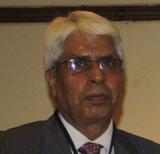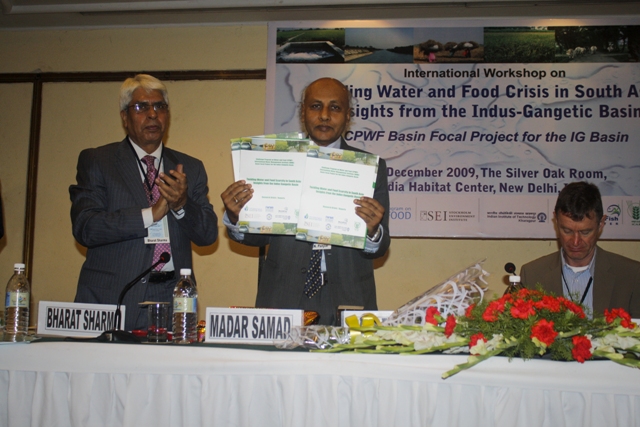Government Programmes
Right to water and sanitation : Water Drops, the Water Aid newsletter
Posted on 16 Dec, 2009 03:21 PMThe newsletter explores the ways in which national laws, court pronouncements and judgements and international commitments can be interpreted to imply a right to water and sanitation.
Specific articles cover:
-Individual court cases and Supreme Court pronouncements
Letter from Rajendra Singh to Jairam Ramesh to withdraw environmental clearance to Athirappilly project
Posted on 14 Dec, 2009 10:27 AMPlease see the letter addressed to Jairam Ramesh by Rajendra SInghji on Athirappilly Issue when he visited the river and the dam site on the 8th December. To read the letter Click Here.
WIO press release on COP 15- Orissa Farmers’ Agenda for the World Leaders attending COP 15
Posted on 08 Dec, 2009 03:23 PMSambalpur, 7th December 2009 - The Fifteenth Conference of the Parties to the UN Framework Convention on Climate Change (UNFCCC) and Fifth Meeting of the Parties to the Kyoto Protocol (COP 15 and COP/MOP 5) begins today, just a day after the Orissa Legislative Assembly’s current session was wrapped up in a hush half way through. The otherwise strong and majority government of Orissa has been i
Speakers and presentations at the IWMI : Bharat Sharma speaks on the use of GIS for estimating basin level water productivity
Posted on 07 Dec, 2009 02:25 AM

Curious case of Ganga Action Plan
Posted on 04 Dec, 2009 06:40 PMThe news is out. On December 2, 2009, Government of India announced its plans of taking a loan to clean the Ganga. This time around the World Bank is extending Rs $1 billion [Rs 4500 crore] loan to India.
Water Evaluation And Planning(WEAP) in the Indus and Ganges basin
Posted on 04 Dec, 2009 11:57 AMThis couldn't have been more relevant to the conversation that we are having here.
Need for a comprehensive water database says Dr Anil Singh of ICAR
Posted on 03 Dec, 2009 07:56 AMUnrestricted flow, reproduction and redistribution of data has been a great concern with most of the projects and research establishments in India. As we heard the Secretary of Ministry of Water Resources voice his recommendations on the ways to tackle the looming water crisis, and the steps that the ministry is taking towards this, we thought of first putting down the highlights of the talks raw, before we get back to them in a detailed manner.
While we compile together all the presentations and papers, here' s a quick update on the talks from the first day. On the research challenges for improving the use and productivity of natural resources in India, Dr. Anil Singh, Deputy Director General, Natural Resource Management, Indian Council of Agriculture Research had an interesting observation linking fertilizer use with water consumption in the gangetic basin. It is assumed that both of these factors impact the crop productivity and this needs to be explored further.
He suggests:
- India needs a ground water management policy.
- The issues discussed in the workshop cut across all the basins in the country and have long term implications.
- Gangetic Basin is critical for our food security
- The attempt to reduce the cropping area would be a difficult proposition. We would have to live with it... area under cultivation is poised to increase and we might want to consider technological options like the cultivation of aerobic rice, SRI etc.
- Another answer is mechanization in the agricultural sector. This may enhance efficiency.
- We must consider a shift to precision farming as well.
Two new publications from the IGB project were released today by the Chief Guest at the workshop, U.N. Panjiar, the Secretary to the Ministry of Water Resources, Government of India. Releasing the reports, Mr. Panjiar presented the government's perception of the present water situation along with some statistical data on the water usage. The challenges of food security and water security are global. Climate change has been an increasing concern too. He observes food security, water secutiry and climate change are closely related. The objective of food security cannot be achieved without water security.
U.N. Panjiar releasing the IWMI publications on Indus-Gangetic Basin with Bharat Sharma and Madar Samad

Anil Singh delivering his speech
Mr. Panjiar puts forward the following recommendations, stating that these could possibly help us manage well, the problem of water crisis.
- A comprehensive water database should be developed.
- Assessment of impact of climate change on rescources is required.
- Promotion of citizen and state action for conservation of resources.
- Focus on overexploited areas.
- 15% aquifers in country are overexploite and another 15 are critical. We must increase water reuse by 20%.
- Basin level resource management is essential.
- Irrigation potential crated and irrigation potential utilized must be to the optimal levels.
- In agreement with Simon Cook, he emphasizes that efficiency is an important issue.
- Water, energy and food productivity are closely linked. This relation and interdependence must be explored.
- Remote Sensing techniques are critical in agriculture and basin management.
Government of India has launched a Water Resource Information System and most of the data is being made public under this project! Policy too, is being revised to make most of the data public and it is projected to be launched by the end of current financial year. Launching a National Water Mission of India is also being mulled over. (Read the related documents here)
Stating that it is important to ensure technology transfer to farmers to achieve “more crop per drop” he talks about a project conducted by the ministry in which 5000 demonstrations of relevant farm technologies were given to the farmers. The interim report of this project indicates that use of such technological interventions is important in improving the yield of the crop and improve water efficiency!
Findings of Basin Focal Project on the Indo-Gangetic basin
Posted on 02 Dec, 2009 02:34 PMNo! This title isn't mine. I borrowed it from Mahmoud Darwish's literary work of the same name.
Speakers and presentations of WHSC 2009 day 3 : Ashok Jaitly talks about the policy issues on water conservation
Posted on 26 Nov, 2009 03:58 AMAshok Jaitly, Water Resources Department, TERI
Policy issues in water conservation
Habil Attarwala, Furaat Earth Ltd., Gujarat
Choice to be made between large scale water projects and decentralized water collection systems,says Ramaswamy Iyer
Posted on 23 Nov, 2009 01:29 PMSometome back, in one of the interviews discussing large dams (with ADB) Ramaswamy Iyer said,






